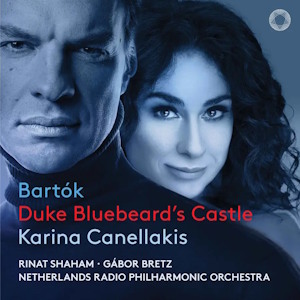
Béla Bartók (1881-1945)
Duke Bluebeard’s Castle (1911 – 1918), Opera in 1 Act
Duke Bluebeard, Gabor Bretz (bass-baritone); Judith, Rinat Shaham (mezzo-soprano)
Netherlands Radio Philharmonic Orchestra/Karina Canellakis
rec. 2024, Muziekcentrum van de Omroep, Hilversum, The Netherlands
Libretto included
Reviewed as a download
Pentatone PTC5187225 [62]
One of the strengths of this new recording of Bartók’s Duke Bluebeard’s Castle is apparent to the listener before a note of music is heard. Gabor Bretz’s delivery of the spoken Prologue is mesmerising. He is sardonic and conversational, placing stresses accordingly, involving us insidiously, almost voyeuristically from the start. He can act. He maintains his grip on us throughout the opera, and his delivery whilst singing is remarkably consistent with the Prologue. It works brilliantly.
I find Bretz so refreshing because many performers seem to give up on the text Béla Balázs produced for the opera. One can’t blame them exactly. It’s ponderous, sometimes obscure, and indeed anti-dramatic at times. All too frequently singers on record and in the opera house adopt a sort of solemn, doom-laden rendition that sounds melodramatic at best. Still, because of the sheer brilliance of Bartók’s music, so inherently dramatic and colourful, the lack of anything approaching acting is unremarked on. Performances are frequently evaluated on the quality of the singing and orchestral playing alone. Bretz shows us there is another way. He has decided to invest the text with a meaning which has an internal logic to him and gives it a delivery that, whilst not fighting against the verse, normalises it. His Bluebeard is also a showman, acutely aware of the Fourth Wall, so his step-by-step revelation is knowingly done with the audience in mind as much as Judith. It’s an utterly convincing performance. And what a voice he has! Karina Canellakis writes in the booklet that it has a ‘gold and burnished colour [which] gives freshness and new life to the role’. This is not hyperbole.
Rinat Shaham’s Judith also has a lot to commend it. If, compared with Bretz, her acting is more one-dimensional, then that is partly because Judith gets even less help from the text than Bluebeard. This occasionally leads to an imbalance in the dramatic dynamic, especially in the crucial Scenes 4 and 5, where first, the dialogue in the garden feels curiously flat. Then, the transition from mood to Scene 5, which should be one of awe on Judith’s behalf, feels forced. Her singing, though, is highly accomplished with beautiful gradations of tone and shade. Just occasionally she is in danger of being overpowered by the orchestra. This is not uncommon for singers in the role since the orchestra almost always matches the emotional climaxes Judith experiences, and I think Shaham was right not to push her voice.
Canellakis clearly loves this piece, and her direction is every bit as accomplished as in her excellent 2023 recording of the Concerto for Orchestra, also on Pentatone (PTC5187027), which Stephen Barber admired too (review). As in that recording, I love the attention to detail that Canellakis brings, her obvious relish of the vivid scoring. I was unsettled by the frenzied woodwind and percussion in the torture chamber, enraptured by the harp in the treasure room, and transported to a suitably pastoral frame of mind by the beautifully combined flute and horn in the garden. I will swear my speakers positively gave off glowing heat in the climatic C major of Scene 5 when orchestra and organ are combined. It helps that, yet again, Pentatone have given us a demonstration class recording.
There is an interesting booklet with an informative essay from Canellakis and full text and translations. However, be aware that the translation shows its age. If you don’t mind Bluebeard asking questions like, ‘Do you hear the bells a-jangling?’ you’ll love it, but surely in 2025 something a bit less olde worlde could be attempted?
Overall, this is a compelling version of Bartók’s dark masterpiece. It is not perfect, but it is hugely satisfying musically and dramatically.
Dominic Hartley
Buying this recording via a link below generates revenue for MWI, which helps the site remain free



See also Ralph Moore’s survey of previous recordings.

















